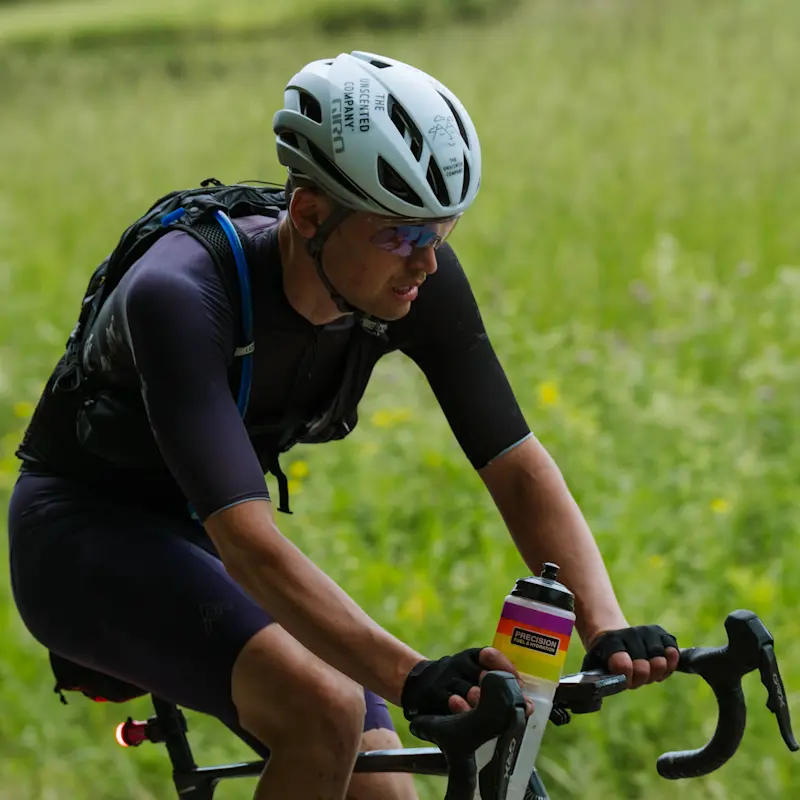
Mathieu's headline numbers
Mathieu's strategy
Fueling
Carbohydrate is the main fuel you burn when racing. Failing to fuel properly is a leading cause of underperformance in longer races.
A clear fueling strategy is essential for an ultra endurance event, and Mathieu had just that. He front-loaded his carb intake, consuming ~130 grams per hour during the first half of this Fastest Known Time (FKT) attempt. Through this, he felt the dose-response benefits of a high carb intake for the first 12 hours of the race. But, in the final hours of the ride, the extreme intake he consumed early on impacted his appetite and his intake dwindled to ~54g/h. The cumulative effect of muscular fatigue, heat intolerance and possible over-consumption in the early parts, on top of a race against the clock meant Mathieu wasn’t tolerating his gels very well after 16 hours. He managed to pivot his strategy on-the-fly to increase his reliance on PF Carb Only Drink Mix, which meant he continued to drip feed carbs until the end. Going forwards, Mathieu may benefit from dropping his carb intake closer to ~90g per hour consistently through the event to help him continue fueling until the end, without overwhelming his gut.
Hydration
Taking on board an appropriate amount of fluid and sodium is essential to maintaining blood volume and supporting the cardiovascular effort needed to perform on race day.
Whilst the absolute amount of sodium and fluid consumed per hour is important, it’s critical to consider these in relation to each other. This is known as 'relative sodium concentration' and it’s expressed in milligrams per litre (mg/L). How much sodium you’re taking in per litre of fluid is more important than the absolute amount taken in per hour.
Sweat sodium concentration (mg/L) is largely genetically determined and remains relatively stable. Knowing how salty your sweat is enables you to replace a good proportion of your sweat losses, which can range from 200-2,000mg/L.
Whilst Mathieu’s losses are on the moderate side, getting his hydration strategy right is still crucial when it’s hot and/or humid as his higher sweat rate in these conditions can result in significant net losses over the duration of a race.
Learn moreMathieu combined PF Carb Only Drink Mix and PH 1500 (Drink Mix) in half of his bottles, and supplemented this with plain water in his hydration pack to deal with the hot, humid conditions. His fluid and sodium intake remained relatively stable throughout, even though perceptually he felt like he dropped off towards the end. While his average fluid intake was what we would recommend, he could have benefited from increasing this further as temperatures rose. Implementing other cooling strategies would have also been beneficial in these conditions. The relative sodium concentration of Mathieu’s intake fell well below his known sweat sodium concentration (Mathieu loses 1,073mg of sodium per litre of sweat) but his intake replaced just under half of that (~467mg/L). This may have further contributed to his digestion issues as sodium aids with the absorption of glucose in the small intestine, so Mathieu’s gut would have been working much harder to digest his food, which may have caused discomfort. Mathieu largely relied on his bottles to hit his carb, sodium and fluid numbers; he could benefit from ‘decoupling’ his fuel and hydration to better monitor and control what he is taking. This strategy would allow him to increase his sodium and fluid intake at times without having to raise his carb consumption simultaneously.
Caffeine
Beyond the Three Levers of Performance (carb, sodium and fluid), caffeine is one of only a few substances that is proven to improve performance for most endurance athletes as it can help stave off mental and physical fatigue.
Saving the first hit of caffeine until later into an ultra endurance effort is sometimes used by athletes to ensure they receive the ergogenic benefit of the stimulant when they start accumulating some muscular fatigue, and so need it most. Mathieu adopted this strategy, delaying his caffeine use to battle tiredness going into the night, where his natural circadian rhythm would be peaking his melatonin levels. Recent research has suggested doses of ~200mg as a first caffeine intake in ultra endurance events to maximise the ‘kick’ and fight off sleep; once Mathieu began using caffeine, he could have increased his doses or made them more frequent to help maintain his energy levels later into the attempt when it started to feel more challenging.
How Mathieu hit his numbers
Here's everything that Mathieu ate and drank on the day...
Mathieu's weapons of choice
Final thoughts
Mathieu's full stats
Data Confidence?
There is some confidence in the quantities and brands of products consumed but the data may lack specifics (e.g. volumes specific flavours). A high number of estimations have been made and the room for error is moderate-high. There may also be the possibility that some intake has been grossly over- or under-estimated.